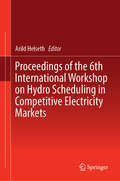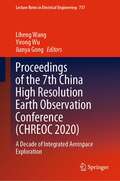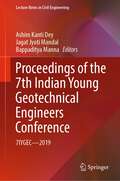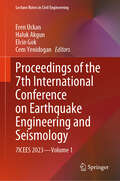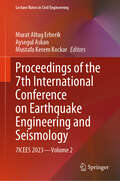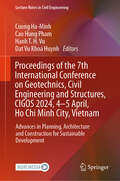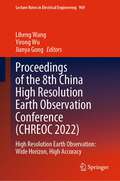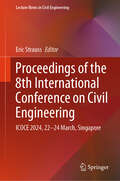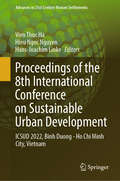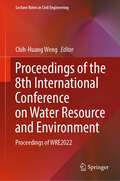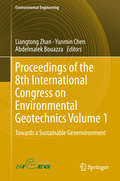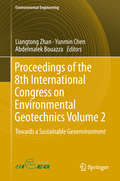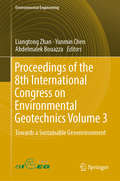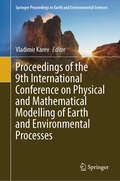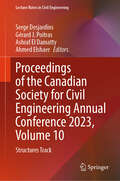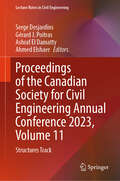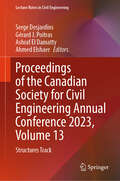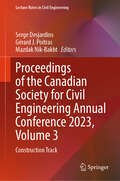- Table View
- List View
Proceedings of the 6th International Workshop on Hydro Scheduling in Competitive Electricity Markets
by Arild HelsethThis book includes a collection of research articles presented at the “6th International Workshop on Hydro Scheduling in Competitive Electricity Markets”. The workshop was a unique and intimate forum for researchers and practitioners to present state-of-the-art research and development concerning novel methodological findings, best practices and real-life applications of hydro scheduling. It also provided a platform for discussing the developments that are taking place in the industry, sharing different experiences and discussing future trends related to this area. This proceedings book is a collection of the most relevant, high-quality articles from the workshop. Discussing the state-of-the-art in the field of hydro scheduling, it is a valuable resource for a wide audience of researchers and practitioners in the field now and in the interesting and challenging times ahead.
Proceedings of the 7th China High Resolution Earth Observation Conference: A Decade of Integrated Aerospace Exploration (Lecture Notes in Electrical Engineering #757)
by Liheng Wang Yirong Wu Jianya GongThis book is the proceedings of the 7th China High-resolution Earth Observation Conference (CHREOC). The series conference of China High Resolution Earth Observation has become an influential academic event in the earth detection area, attracting more and more top experts and industry users of related fields. The CHREOCs focus on the popular topics including military-civilian integration, the One Belt and One Road project, the transformation of scientific research achievements. They also discuss the new ideas, new technologies, new methods, and new developments. The CHREOCs have effectively promoted high-level institutional mechanisms, technological innovation, and industrial upgrading in the high-resolution earth observation area, and extend the influences of the state-sponsored major projects.
Proceedings of the 7th Indian Young Geotechnical Engineers Conference: 7IYGEC - 2019 (Lecture Notes in Civil Engineering #195)
by Ashim Kanti Dey Jagat Jyoti Mandal Bappaditya MannaThis book comprises the select peer-reviewed papers presented at the 7th Indian Young Geotechnical Engineers Conference (7IYGEC 2019) held at the National Institute of Technology, Silchar. It covers recent research developments in geotechnical engineering particularly in the fields of shallow and deep foundations, rock mechanics, ground improvement techniques, geotechnical earthquake engineering, and characterization of soil. The book also discusses several computational techniques to model behavior of soil which can be useful for future research. A special emphasis is given on geo-environmental engineering for making the world cleaner and safer to live. Given the contents, the book will be beneficial for students, researchers, and professionals working in geotechnical engineering and allied areas.
Proceedings of the 7th International Conference on Civil Engineering: ICOCE 2023, 24–26 March, Singapore (Lecture Notes in Civil Engineering #371)
by Eric StraussThis book contains research papers presented at the 7th International Conference on Civil Engineering, which was held in Singapore from 24-26 March 2023. Significant results contained in the book show the importance of technology in solving engineering issues throughout the world. Highlighted topics include climate change, disaster relief, resilience, pollution control and management techniques for construction, mitigation and adaptation. Many techniques are utilized in a variety of contexts to solve engineering and urban management problems in both developed and developing countries. This volume consists of refereed submissions authored by a wide variety of international researchers and practitioners from many perspectives discussing emerging issues in civil and environmental engineering. Practical solutions to worldwide issues in hazard mitigation, pollution control, transportation infrastructure and energy production are emphasized. The chapters provide an in-depth look at current issues in these areas of engineering that should benefit interested individuals at all levels of expertise.
Proceedings of the 7th International Conference on Earthquake Engineering and Seismology: 7ICEES 2023—Volume 1 (Lecture Notes in Civil Engineering #488)
by Eren Uckan Haluk Akgun Elcin Gok Cem YenidoganThis volume gathers the proceedings of the 7th International Conference on Earthquake Engineering and Seismology (7ICEES), held in Antalya, Turkey on November 6-10, 2023, and affiliated with the 18th World Conference on Seismic Isolation (18WCSI). The conference discussed state-of-the-art information as well as emerging concepts and innovative applications related to earthquake engineering and seismology, in particular structural or non-structural risk mitigation tools for critical infrastructure. The contributions, which are published after a rigorous international peer-review process, highlight numerous exciting ideas that will spur novel research directions and foster multidisciplinary collaboration among different specialists.
Proceedings of the 7th International Conference on Earthquake Engineering and Seismology: 7ICEES 2023—Volume 2 (Lecture Notes in Civil Engineering #401)
by Murat Altug Erberik Aysegul Askan Mustafa Kerem KockarThis volume gathers the proceedings of the 7th International Conference on Earthquake Engineering and Seismology (7ICEES), held in Antalya, Turkey on November 6-10, 2023, and affiliated with the 18th World Conference on Seismic Isolation (18WCSI). The conference discussed state-of-the-art information as well as emerging concepts and innovative applications related to earthquake engineering and seismology, in particular structural or non-structural risk mitigation tools for critical infrastructure. The contributions, which are published after a rigorous international peer-review process, highlight numerous exciting ideas that will spur novel research directions and foster multidisciplinary collaboration among different specialists.
Proceedings of the 7th International Conference on Geotechnics, Civil Engineering and Structures, CIGOS 2024, 4-5 April, Ho Chi Minh City, Vietnam: Advances in Planning, Architecture and Construction for Sustainable Development (Lecture Notes in Civil Engineering #482)
by Cuong Ha-Minh Dat Vu Khoa Huynh Cao Hung Pham Hanh T. H. VuThis book includes peer-reviewed articles from the 7th International Conference on Geotechnics, Civil Engineering and Structures (CIGOS 2024) held on April 4-5 in Ho Chi Minh City, Vietnam. It highlights recent advances in planning, architecture, and construction for sustainable development. The book features a compilation of articles presented at the conference, bringing together researchers, academics, and practitioners from around the world. The topics covered range from Planning, Architecture, and Industrial Design to Construction, Materials, Structures, and Digital Technologies, as well as Geoscience, Environment, and Energy, and Transportation, Infrastructure, Management, and Investment. The book emphasizes the importance of a multidisciplinary approach to sustainable development in order to address environmental, social, and economic challenges faced by societies worldwide. It provides insights into best practices and innovative approaches for achieving sustainabledevelopment goals, such as reducing the carbon footprint, enhancing energy efficiency, promoting the use of eco-friendly materials, and implementing sustainable construction techniques. Overall, this book offers valuable knowledge and advice to professionals, researchers, and policymakers engaged in sustainable development initiatives.
Proceedings of the 7th International Conference on the Applications of Science and Mathematics 2021: Sciemathic 2021 (Springer Proceedings in Physics #273)
by Aida Binti Mustapha Suhadir Shamsuddin Syed Zuhaib Haider Rizvi Saliza Binti Asman Siti Suhana JamaianThis book presents peer-reviewed articles and recent advances on the potential applications of Science and Mathematics for future technologies, from the 7th International Conference on the Applications of Science and Mathematics (SCIEMATHIC 2021), held in Malaysia. It provides an insight about the leading trends in sustainable Science and Technology. The world is looking for sustainable solutions to problems more than ever. The synergistic approach of mathematicians, scientists and engineers has undeniable importance for future technologies. With this viewpoint, SCIEMATHIC 2021 has the theme “Quest for Sustainable Science and Mathematics for Future Technologies”. The conference brings together physicists, mathematicians, statisticians and data scientists, providing a platform to find sustainable solutions to major problems around us. The works presented here are suitable for professionals and researchers globally in making the world a better and sustainable place.
Proceedings of the 8th China High Resolution Earth Observation Conference: High Resolution Earth Observation: Wide Horizon, High Accuracy (Lecture Notes in Electrical Engineering #969)
by Liheng Wang Yirong Wu Jianya GongThis proceedings has four thematic parts: advanced aerospace manufacturing technology, near space system and application technology, accurate perception technology of the earth, and collaborative fusion application technology. The CHREOCs (China High-resolution Earth Observation Conference) focus on the popular topics including military-civilian integration, the One Belt and One Road project, the transformation of scientific research achievements, and it also discusses the new ideas, new technologies, new methods, and new developments. The CHREOCs have effectively promoted high-level institutional mechanisms, technological innovation, and industrial upgrading in the high-resolution earth observation area, and arouse the influence of the national-sponsored major project. All papers in this proceeding are from the 8th CHREOC, and most authors are the researchers and experts participating the state major project CHEOS. The papers are the extraction of research results and reflect the technique level and research direction of the field high-resolution earth observation. All articles have gone through the scientific and strict reviews for several rounds by the experts from the related fields, and therefore reflect the research level and technology innovation of the high-resolution field earth observation. It will be an informative and valuable reference for both academic research and engineering practice. The year 2022 is the final year of high-resolution special projects. After more than ten years of construction, the task of high-resolution special projects has been basically completed, the core technology has been comprehensively breakthrough, and the typical achievements have been rapidly transformed, providing strong support for national security, national defense construction and national economic development.
Proceedings of the 8th International Conference on Civil Engineering: ICOCE 2024, 22–24 March, Singapore (Lecture Notes in Civil Engineering #539)
by Eric StraussThis book consists of the most recent group of peer-reviewed research papers presented at the 8th International Conference on Civil Engineering, ICOCE 2024 held in Singapore from March 22 to 24. Important issues addressed in the book show the emerging relationships between technology and the built environment. Engineering solutions are treated from a global perspective. Highlighted fields of inquiry include hazard mitigation, materials management, transportation, water resources, and public policy. The authors outline solutions to physical, environmental, and social problems in many different contexts. This book contains refereed articles authored by a wide variety of international researchers and practitioners from many perspectives discussing current research solutions from a global perspective to problems in civil and environmental engineering. Examples that cover construction management, water issues, public safety, and urban development are emphasized. The chapters contain a wide variety of applications that appeal to readers with varying levels of knowledge and interest in the important issues relevant to international engineering.
Proceedings of the 8th International Conference on Sustainable Urban Development: ICSUD 2022, Binh Duong - Ho Chi Minh City, Vietnam (Advances in 21st Century Human Settlements)
by Hans-Joachim Linke Vien Thuc Ha Hieu Ngoc NguyenThis book includes peer-reviewed articles from the 8th International Conference on Sustainable Urban Development (ICSUD 2022), held at the Vietnamese-German University (VGU) in Vietnam. The theme of the conference is “innovative and inclusive growth models for sustainable urban development”. Articles in this book present major issues that cities and regions around the world are facing these days to adapt to new, unexpected, and profound challenges.Over past few years, the world has been observing meaningful reactions to crises. From the pandemic to war, energy, and food shortages, there are always opportunities for innovations. Some firms still thrived in the city lock-down; some groups stayed healthier with less income; and certain municipalities consumed less resources to attain higher outcomes. However, the rise of digital economy, the importance of proximity or near-shore supply chain, or the new contribution of different communities at different levels are generalized asnew growth models for changes.
Proceedings of the 8th International Conference on Water Resource and Environment: Proceedings of WRE2022 (Lecture Notes in Civil Engineering #341)
by Chih-Huang WengThis book presents select proceedings of the 8th International Conference on Water Resource and Environment (WRE 2022) which is held in Xi’an, China, November 1-4, 2022. The book covers a wide range of topics, including Hydraulics, Hydrology and Water Resources Engineering, Environmental Engineering and Sustainability, Indoor Environments, Risk Analysis, Safety and Security, Ocean and Offshore Engineering; Ships and Floating Structures, Coastal Engineering. It will be useful for researchers and engineers working in water and environment related fields.
Proceedings of the 8th International Conference on the Applications of Science and Mathematics: SCIEMATHIC 2022; 17—19 Oct; Malaysia (Springer Proceedings in Physics #294)
by Syed Zuhaib Haider Rizvi Aida Mustapha Norzuria Ibrahim Hatijah Basri Mohd Saifullah RusimanThis book presents peer-reviewed articles and recent advances on the potential applications of Science and Mathematics for future technologies, from the 8th International Conference on the Applications of Science and Mathematics (SCIEMATHIC 2022), held in Malaysia. It provides an insight about the leading trends in sustainable Science and Technology. Topics included in this proceedings are in the areas of Mathematics and Statistics, including Natural Science, Engineering and Artificial Intelligence.
Proceedings of the 8th International Congress on Environmental Geotechnics Volume 1: Towards a Sustainable Geoenvironment (Environmental Science and Engineering)
by Yunmin Chen Liangtong Zhan Abdelmalek BouazzaThis book gathers selected papers presented at the 8th International Congress on Environmental Geotechnics (ICEG), held on October 28 - November 1, 2018 in Hangzhou, China. The theme of the congress is “Towards a Sustainable Geoenvironment”, which means meeting the needs of the present generation without compromising the ability of future generations to meet their own needs. Under this theme, the congress covers a broad range of topics and provides an excellent opportunity for academics, engineers, scientists, government officials, regulators, and planners to present, discuss and exchange notes on the latest advances and developments in the research and application of environmental geotechnics.
Proceedings of the 8th International Congress on Environmental Geotechnics Volume 2: Towards a Sustainable Geoenvironment (Environmental Science and Engineering)
by Yunmin Chen Liangtong Zhan Abdelmalek BouazzaThis is the third volume of the proceedings of the 8th International Congress on Environmental Geotechnics (ICEG 2018), held on October 28 - November 1, 2018 in Hangzhou, China. The theme of the congress is “Towards a Sustainable Geoenvironment”, which means meeting the needs of the present generation without compromising the ability of future generations to meet their own needs. Under this theme, the congress covers a broad range of topics and provides an excellent opportunity for academics, engineers, scientists, government officials, regulators, and planners to present, discuss and exchange notes on the latest advances and developments in the research and application of environmental geotechnics.
Proceedings of the 8th International Congress on Environmental Geotechnics Volume 3: Towards a Sustainable Geoenvironment (Environmental Science and Engineering)
by Yunmin Chen Liangtong Zhan Abdelmalek BouazzaThis book gathers selected papers presented at the 8th International Congress on Environmental Geotechnics (ICEG), held on October 28 - November 1, 2018 in Hangzhou, China. The theme of the congress is “Towards a Sustainable Geoenvironment”, which means meeting the needs of the present generation without compromising the ability of future generations to meet their own needs. Under this theme, the congress covers a broad range of topics and provides an excellent opportunity for academics, engineers, scientists, government officials, regulators, and planners to present, discuss and exchange notes on the latest advances and developments in the research and application of environmental geotechnics.
Proceedings of the 9th International Conference on Physical and Mathematical Modelling of Earth and Environmental Processes (Springer Proceedings in Earth and Environmental Sciences)
by Vladimir KarevThis book presents short papers of participants of the 9th International Scientific Conference-School for Young Scientists «Physical and Mathematical Modeling of Earth and Environment Processes. A special focus is given to the extraction of hydrocarbon resources, including from unconventional sources. An alternative to the use of hydrocarbons as a main source of energy on the Planet in the coming decades is unlikely to be found. At the same time, the resource base of hydrocarbons is quickly depleted, in particularly, large and accessible oil and gas fields. The shale oil and gas, Arctic hydrocarbon stocks, gas hydrates, coal bed methane, oil and gas from deep horizons can become new sources. "Deep oil" may be the most promising source of expanding the resource base of hydrocarbons according to many experts. New technologies are required to their development. Efficient low-cost technologies can be created on the basis of geomechanical approach, i.e., through the use of a huge elastic energy stored in the rock massif due to rock pressure. The creation of new breakthrough approaches to the development of hydrocarbon fields is very important in today's geopolitical conditions and requires the involvement of young minds and strength. International activities, including the youth scientific schools, can become an effective tool for exchange of information and the organizing of interdisciplinary research of processes in geo-environment. The book presents the new results of the experimental and theoretical modeling of deformation, fracture, and filtration processes in the rocks in connection to issues of creating scientific fundamentals for new hydrocarbon production technologies. The investigations of the dependence of well stability and permeability of rocks on the stress-strain state in conditions of deep horizons and high rock pressure are also represented.
Proceedings of the Canadian Society for Civil Engineering Annual Conference 2023, Volume 10: Structures Track (Lecture Notes in Civil Engineering #504)
by Ashraf El Damatty Serge Desjardins Gérard J. Poitras Ahmed ElshaerThis book comprises the proceedings of the Annual Conference of the Canadian Society for Civil Engineering 2023. The contents of this volume focus on the specialty track in structural engineering with topics on bridge design, FRP concrete structures, innovation in structural engineering, seismic analysis and design, wind load on structures, masonry structures, structural optimization, machine learning and AI in structural engineering, and wood and timber structures, among others. This volume will prove a valuable resource for researchers and professionals.
Proceedings of the Canadian Society for Civil Engineering Annual Conference 2023, Volume 11: Structures Track (Lecture Notes in Civil Engineering #505)
by Ashraf El Damatty Serge Desjardins Gérard J. Poitras Ahmed ElshaerThis book comprises the proceedings of the Annual Conference of the Canadian Society for Civil Engineering 2023. The contents of this volume focus on the specialty track in structural engineering with topics on bridge design, FRP concrete structures, innovation in structural engineering, seismic analysis and design, wind load on structures, masonry structures, structural optimization, machine learning and AI in structural engineering, and wood and timber structures, among others. This volume will prove a valuable resource for researchers and professionals.
Proceedings of the Canadian Society for Civil Engineering Annual Conference 2023, Volume 12: Structures Track (Lecture Notes in Civil Engineering #506)
by Ashraf El Damatty Serge Desjardins Gérard J. Poitras Ahmed ElshaerThis book comprises the proceedings of the Annual Conference of the Canadian Society for Civil Engineering 2023. The contents of this volume focus on the specialty track in structural engineering with topics on bridge design, FRP concrete structures, innovation in structural engineering, seismic analysis and design, wind load on structures, masonry structures, structural optimization, machine learning and AI in structural engineering, and wood and timber structures, among others. This volume will prove a valuable resource for researchers and professionals.
Proceedings of the Canadian Society for Civil Engineering Annual Conference 2023, Volume 13: Structures Track (Lecture Notes in Civil Engineering #507)
by Ashraf El Damatty Serge Desjardins Gérard J. Poitras Ahmed ElshaerThis book comprises the proceedings of the Annual Conference of the Canadian Society for Civil Engineering 2023. The contents of this volume focus on the specialty track in structural engineering with topics on bridge design, FRP concrete structures, innovation in structural engineering, seismic analysis and design, wind load on structures, masonry structures, structural optimization, machine learning and AI in structural engineering, and wood and timber structures, among others. This volume will prove a valuable resource for researchers and professionals.
Proceedings of the Canadian Society for Civil Engineering Annual Conference 2023, Volume 1: General Track (Lecture Notes in Civil Engineering #495)
by Serge Desjardins Gérard J. PoitrasThis book comprises the proceedings of the Annual Conference of the Canadian Society for Civil Engineering 2023. The contents of this volume focus on the general conference with topics on transportation, climate adaptability, sustainable design, green buildings, cold regions, and civil engineering education, among others. This volume will prove a valuable resource for researchers and professionals.
Proceedings of the Canadian Society for Civil Engineering Annual Conference 2023, Volume 2: General Track (Lecture Notes in Civil Engineering #496)
by Serge Desjardins Gérard J. PoitrasThis book comprises the proceedings of the Annual Conference of the Canadian Society for Civil Engineering 2023. The contents of this volume focus on the general conference with topics on transportation, climate adaptability, sustainable design, green buildings, cold regions, and civil engineering education, among others. This volume will prove a valuable resource for researchers and professionals.
Proceedings of the Canadian Society for Civil Engineering Annual Conference 2023, Volume 3: Construction Track (Lecture Notes in Civil Engineering #497)
by Mazdak Nik-Bakht Serge Desjardins Gérard J. PoitrasThis book comprises the proceedings of the Annual Conference of the Canadian Society for Civil Engineering 2023. The contents of this volume focus on the specialty track in construction with topics on modular and offsite construction, BIM, construction planning and project management, construction automation, AI and robotics in construction, sustainable construction, asset management, and construction safety, among others. This volume will prove a valuable resource for researchers and professionals.
Proceedings of the Canadian Society for Civil Engineering Annual Conference 2023, Volume 4: Construction Track (Lecture Notes in Civil Engineering #498)
by Mazdak Nik-Bakht Serge Desjardins Gérard J. PoitrasThis book comprises the proceedings of the Annual Conference of the Canadian Society for Civil Engineering 2023. The contents of this volume focus on the specialty track in construction with topics on modular and offsite construction, BIM, construction planning and project management, construction automation, AI and robotics in construction, sustainable construction, asset management, and construction safety, among others. This volume will prove a valuable resource for researchers and professionals.
